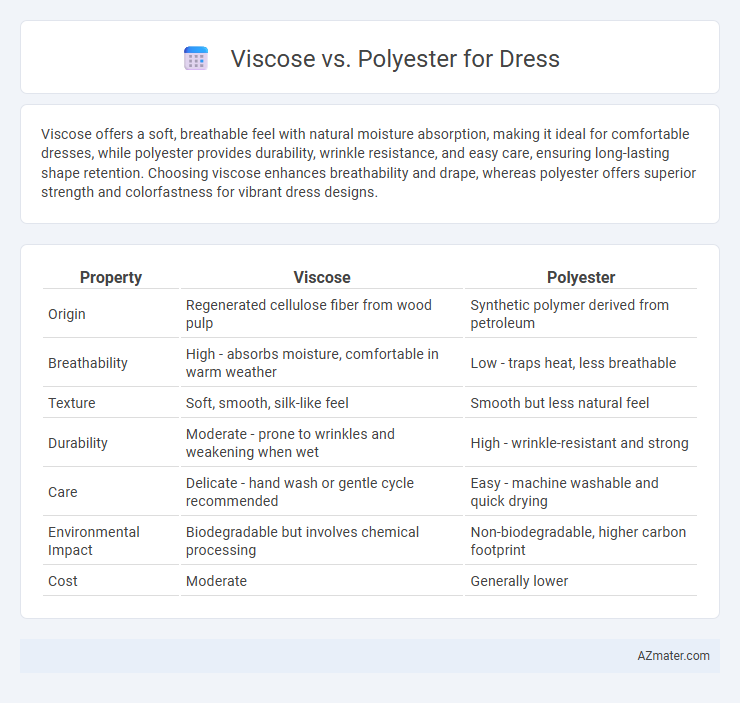Viscose offers a soft, breathable feel with natural moisture absorption, making it ideal for comfortable dresses, while polyester provides durability, wrinkle resistance, and easy care, ensuring long-lasting shape retention. Choosing viscose enhances breathability and drape, whereas polyester offers superior strength and colorfastness for vibrant dress designs.
Table of Comparison
| Property | Viscose | Polyester |
|---|---|---|
| Origin | Regenerated cellulose fiber from wood pulp | Synthetic polymer derived from petroleum |
| Breathability | High - absorbs moisture, comfortable in warm weather | Low - traps heat, less breathable |
| Texture | Soft, smooth, silk-like feel | Smooth but less natural feel |
| Durability | Moderate - prone to wrinkles and weakening when wet | High - wrinkle-resistant and strong |
| Care | Delicate - hand wash or gentle cycle recommended | Easy - machine washable and quick drying |
| Environmental Impact | Biodegradable but involves chemical processing | Non-biodegradable, higher carbon footprint |
| Cost | Moderate | Generally lower |
Introduction to Viscose and Polyester
Viscose is a semi-synthetic fiber made from regenerated cellulose derived from wood pulp, known for its silk-like feel, breathability, and excellent drape, making it a popular choice for dresses that require softness and comfort. Polyester, a fully synthetic fiber produced from petroleum-based products, offers high durability, resistance to wrinkles and shrinkage, and quick drying properties, providing practical benefits for everyday wear. Both fibers vary significantly in texture, moisture management, and environmental impact, influencing their suitability for different dress styles and occasions.
Origins and Manufacturing Processes
Viscose, derived from natural cellulose often sourced from wood pulp, undergoes a chemical-intensive process involving treating cellulose with alkali and carbon disulfide to produce a semi-synthetic fiber, prized for its silk-like feel and breathability. Polyester, a fully synthetic fiber made from petroleum-based polymers through a polymerization process, offers durability, wrinkle resistance, and moisture-wicking properties ideal for mass-produced dresses. The environmental impact of viscose includes deforestation and chemical pollution, whereas polyester contributes to microplastic pollution and relies on non-renewable fossil fuels.
Texture and Feel: Comparing Comfort
Viscose fabric offers a soft, breathable texture that mimics natural fibers, making dresses comfortable and ideal for warm weather. Polyester feels smoother and more synthetic, often less breathable but more resistant to wrinkles and shrinkage. The choice between viscose and polyester depends on whether breathability and softness or durability and wrinkle resistance are prioritized for dress comfort.
Breathability and Moisture Management
Viscose fabric offers superior breathability compared to polyester, making it ideal for warm weather dresses by allowing air to circulate and reducing heat buildup. Its natural moisture absorption properties help wick sweat away from the skin, enhancing overall comfort during prolonged wear. In contrast, polyester is less breathable and tends to trap moisture, which can lead to a clammy feel and reduced comfort in hot or humid conditions.
Durability and Longevity
Viscose, a semi-synthetic fiber made from cellulose, tends to have a softer texture but lower durability compared to polyester, which is a fully synthetic fiber known for its high strength and resistance to wear and tear. Polyester dresses maintain their shape and color longer under frequent washing and environmental exposure, making them more suitable for long-term use. The moisture-absorbing properties of viscose can cause it to degrade faster, while polyester's hydrophobic nature enhances its longevity and resistance to stretching or shrinking.
Care and Maintenance Requirements
Viscose dresses require gentle hand washing or delicate machine cycles with cold water to prevent shrinking and maintain fabric softness, while polyester dresses tolerate regular machine washing and dry quickly without wrinkles. Avoid high heat when drying viscose to prevent damage, whereas polyester resists heat better but should still be air-dried or tumble-dried on low to preserve elasticity. Both fabrics benefit from low-heat ironing, with viscose requiring extra caution to avoid fabric distortion and polyester being more wrinkle-resistant overall.
Eco-Friendliness and Sustainability
Viscose, derived from natural cellulose fibers, offers better biodegradability compared to synthetic polyester, which is petroleum-based and non-biodegradable. The production of viscose, however, can involve environmentally harmful chemicals and high water usage, raising concerns about its sustainability. Polyester's durability and recyclability provide a longer lifespan and potential for circular use, but its reliance on fossil fuels and microplastic pollution challenge its eco-friendliness.
Cost and Affordability Factors
Viscose dresses typically cost more than polyester due to higher production expenses and natural fiber content, but they offer a softer, more breathable feel. Polyester is more affordable and durable, making it a popular choice for budget-conscious shoppers seeking easy-care and wrinkle-resistant dresses. Cost efficiency in polyester often outweighs viscose's comfort, especially in mass-produced fashion markets.
Best Occasions for Viscose and Polyester Dresses
Viscose dresses excel for casual outings, summer events, and daytime gatherings due to their breathable, lightweight fabric that drapes beautifully and enhances comfort in warm weather. Polyester dresses are ideal for formal occasions, evening wear, and outdoor events, offering durability, wrinkle resistance, and vibrant color retention even in humid or unpredictable conditions. Choosing viscose suits relaxed, airy environments, while polyester is better for structured styles requiring longevity and ease of care.
Choosing the Right Fabric for Your Dress
Viscose offers a soft, breathable texture ideal for flowy, comfortable dresses, making it perfect for warm weather and casual wear. In contrast, polyester provides durability, wrinkle resistance, and vibrant color retention, suited for structured dresses and formal occasions. Selecting the right fabric depends on prioritizing breathability and comfort with viscose or durability and easy maintenance with polyester for your dress.

Infographic: Viscose vs Polyester for Dress
 azmater.com
azmater.com